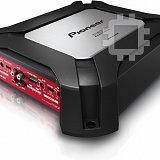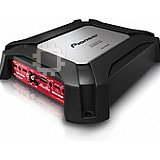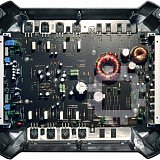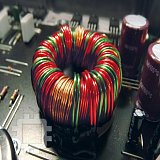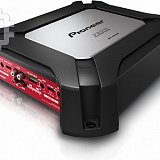Pioneer GM-6500F: инструкция
Характеристики, спецификации
Инструкция к Усилителю Мощности Pioneer GM-6500F

English NederlandsDeutschEspañolItalianoFrançais Русский
Owner’s Manual
Mode d’emploi
BRIDGEABLE FOUR-CHANNEL POWER AMPLI-
FIER
AMPLIFICATEUR DE PUISSANCE PONTABLE À
QUATRE CANAUX
AMPLIFICATORE DI POTENZA A QUATTRO CANA-
LI COLLEGABILE A PONTE
AMPLIFICADOR DE POTENCIA DE CUATRO CA-
NALES EN PUENTE
SCHAKELBARE 4-KANAALSVERSTERKER
BRÜCKBARER 4-KANAL-LEISTUNGSVERSTÄR-
KER
ЧЕТЫРЕХКАНАЛЬНЫЙ УСИЛИТЕЛЬ МОЩНО-
СТИ С ВОЗМОЖНОСТЬЮ МОСТОВОГО ВКЛЮЧЕ-
НИЯ
GM-6500F

Section
01
Before you start
! We offer the latest information about
PIONEER CORPORATION on our
website.
In case of trouble
If you want to dispose this product, do not mix
Should this product fail to operate properly,
it with general household waste. There is a se-
please contact your dealer or nearest author-
parate collection system for used electronic
ized Pioneer Service Station.
products in accordance with legislation that re-
quires proper treatment, recovery and recy-
cling.
Before connecting/
Private households in the member states of
installing the amplifier
the EU, in Switzerland and Norway may return
their used electronic products free of charge
WARNING
to designated collection facilities or to a retai-
! The use of a special red battery and ground
ler (if you purchase a similar new one).
wire RD-223, available separately, is recom-
For countries not mentioned above, please
mended. Connect the battery wire directly to
contact your local authorities for the correct
the car battery positive terminal + and the
method of disposal.
ground wire to the car body.
By doing so you will ensure that your disposed
! This unit is for vehicles with a 12 V battery and
product undergoes the necessary treatment,
negative grounding. Before installing in re-
recovery and recycling and thus prevent po-
creational vehicles, trucks or buses, check the
tential negative effects on the environment
battery voltage.
and human health.
! Always use a fuse of the rating prescribed.
The use of an improper fuse could result in
overheating and smoke, damage to the pro-
duct and injury, including burns.
Thank you for purchasing
! Check the connections of the power supply
this PIONEER product.
and speakers if the fuse of the separately sold
To ensure proper use, please read through this
battery wire or the amplifier fuse blows. Deter-
manual before using this product. It is espe-
mine and resolve the cause, then replace the
cially important that you read and observe
fuse with and identical equivalent.
WARNINGs and CAUTIONs in this manual.
! Do not allow this unit to come into contact
Please keep the manual in a safe and accessible
with liquids. Electrical shock could result.
place for future reference.
Also, damage to this unit, smoke, and over-
heating could result from contact with liquids.
The surfaces of the amplifier and any attached
speakers may also heat up and cause minor
Visit our website
burns.
Visit us at the following site:
http://www.pioneer.co.uk
! Register your product. We will keep the de-
tails of your purchase on file to help you
refer to this information in the event of an
insurance claim such as loss or theft.
2
En

Section
Before you start
01
English
! In the event of any abnormality, the power
supply to the amplifier is cut off to prevent
equipment malfunction. If this occurs, switch
the system power off and check the power
supply and speaker connections. If you are un-
able to determine the cause, please contact
your dealer.
! Always disconnect the negative * terminal of
the battery beforehand to avoid the risk of
electric shock or short circuit during installa-
tion.
CAUTION
! Always keep the volume low enough to hear
outside sounds.
! Extended use of the car stereo while the en-
gine is at rest or idling may exhaust the bat-
tery.
About the Protection function
The Protection function will operate in the condi-
tions outlined below. If the Protection function is
turned on, the power indicator will turn off, and
the amplifier will shut down.
! If the speaker output terminal and speaker
wire is short-circuited.
! If the temperature inside the amplifier gets too
high.
! If a DC voltage is applied to the speaker out-
put terminal.
3
En

Section
02
Setting the unit
! For use with an RCA equipped car stereo
What’s what
(standard output of 500 mV), set to the
Front side
NORMAL position. For use with an RCA
equipped Pioneer car stereo, with max.
output of 4 V or more, adjust level to
match that of the car stereo output.
3 INPUT SELECT (input select) switch
Select 2CH for two-channel input and 4CH
Rear side
for four–channel input.
! You can select input select only for con-
nections when using the RCA input jack.
For connections when using the speaker
input wire, 4CH will be used automati-
cally no matter which switch setting is
To adjust the switch, use a flathead screwdri-
selected.
ver if needed.
4 FREQ (cut off frequency) control
1 LPF (low-pass filter)/HPF (high-pass fil-
Cut off frequency selectable from 40 Hz to
ter) select switch
500 Hz if the LPF/HPF select switch is set to
Switch the settings based on the connected
LPF or HPF.
speaker.
! You can select cut off frequency only for
! When the Subwoofer is connected:
CHANNEL B.
Select LPF. This eliminates high range
5 Power indicator
frequency and outputs low range fre-
The power indicator lights up to indicate
quency.
power ON.
! When the full range speaker is con-
nected:
Select HPF or OFF. HPF eliminates low
range frequency and output high range
Setting gain properly
frequency. OFF outputs the entire fre-
! Protective function included to prevent
quency range.
malfunction of the unit and/or speakers
due to excessive output, improper use or
2 GAIN (gain) control
improper connection.
Adjusting gain controls CHANNEL A (chan-
! When outputting high volume sound etc.,
nel A) and CHANNEL B (channel B) helps
this function cuts off the output for a few
align the car stereo output to the Pioneer
seconds as a normal function, but output
amplifier. Default setting is the NORMAL
is restored when the volume of the head
position.
unit is turned down.
If output remains low, even when the car
! A cut in sound output may indicate impro-
stereo volume is turned up, turn controls to
per setting of the gain control. To ensure
lower level. If distortion occurs when the car
continuous sound output with the head
stereo volume is turned up, turn these con-
unit at a high volume, set amplifier gain
trols to higher level.
control to a level appropriate for the preout
! If using only one input plug, set the gain
maximum output level of the head unit, so
controls for speaker outputs A and B to
that volume can remain unchanged and to
the same position.
control excess output.
4
En

Section
Setting the unit
02
English
! Despite correct volume and gain settings,
the unit sound still cuts out periodically. In
such cases, please contact the nearest
authorized Pioneer Service Station.
Gain control of this unit
Preout level: 2 V
(Standard: 500 mV)
Above illustration shows NORMAL gain set-
ting.
Relationship between amplifier gain
and head unit output power
If amplifier gain is raised improperly, this will
simply increase distortion, with little increase
in power.
Signal waveform when outputting at
high volume using amplifier gain
control
Signal waveform distorted with high output, if
you raise the gain of the amplifier the power
changes only slightly.
5
En
Оглавление
- Before you start
- Setting the unit
- Connecting the units
- Installation
- Additional information
- Avant de commencer
- Réglage de l’appareil
- Connexion des appareils
- Connexions lors de l’utilisation du jack d’entrée RCA
- Connexion des appareils
- Installation
- Informations complémentaires
- Prima di iniziare
- Impostazione dell’unità
- Collegamento delle unità
- Collegamenti utilizzando un connettore di ingresso RCA
- Collegamento delle unità
- Installazione
- Informazioni supplementari
- Antes de comenzar Visite nuestro sitio Web
- Antes de comenzar
- Configuración de la unidad
- Conexión de las unidades
- Conexiones al utilizar una toma de entrada RCA
- Conexión de las unidades
- Instalación
- Información adicional
- Bevor Sie beginnen
- Einstellen des geräts
- Anschließen der Geräte
- Anschlüsse bei Verwendung des Cinch-Eingangs
- Anschließen der Geräte
- Installation
- Zusätzliche Informationen
- Vóór u begint
- Het toestel installeren
- De toestellen aansluiten
- Aansluiting via de RCA-ingang
- De toestellen aansluiten
- Installatie
- Aanvullende informatie
- Перед началом эксплуатации
- Настройка усилителя
- Подключение устройств
- Подключение устройств Перед подключением Режим мостового соединения усилителя
- Подключение устройств
- Подключение с использованием входного гнезда RCA
- Подключение устройств
- Установка
- Дополнительная информация

